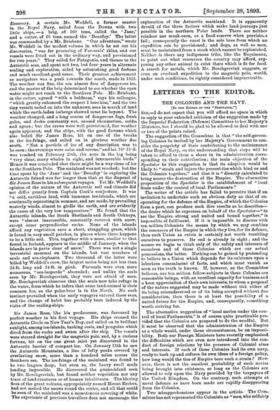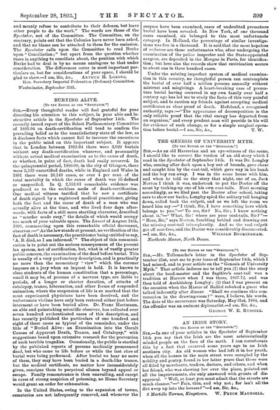LETTERS TO THE EDITOR.
THE COLONIES AND THE NAVY.
[To TEE EDITOR OP TEE " SPECTATOR."] SIR,-I do not expect that you will afford me space in which to reply to your extended criticism of the suggestion made by the Imperial Federation (Defence) Committee to her Majesty's Ministers, but I should be glad to be allowed to deal with one or two of the points raised.
The suggestion of the Committee is that "the self-govern- ing Colonies be invited by her Majesty's Government to con- sider the propriety of their contributing to the maintenance of the Royal Navy, on the understanding that steps will be taken to afford to them a share in its administration corre- sponding to their contribution; the main objection of the Spectator to this suggestion is that its adoption would be likely to "strain and injure the present ties which bind us and the Colonies together," and that it is "directly calculated to bring nearer the destruction of the Empire. The alternative proposition of the Spectator is the establishment of " local fleets under the control of local Parliaments."
The writer of the article has failed to perceive that if an invitation to undertake such an obvious duty as that of co- operating for the defence of the Empire, of which the Colonies form a part, can produce such dire results as he describes— the desire which he expresses on behalf of the Spectator—" to see the Empire strong and united and bound together," is impossible of fulfilment. If it is impossible to discuss with ten million Colonists the means by which we may combine the resources of the Empire in which they live, for its defence, then such Union as exists is certainly not worth troubling ourselves to preserve. Its end is already in sight ; and the sooner we begin to think only of the safety and interests of ourselves and of those Colonies which are our actual possessions, the better. Nothing can be gained by pretending to believe in a Union which depends for its existence upon a. laborious concealment of facts, and which must vanish as soon as the truth is known. If, however, as the Committee believes, our ten million fellow-subjects in these Colonies are reasonable beings, with an excellent capacity for business and a keen appreciation of their own interests, to whom a proposal of the nature suggested may be made without risk either of its being misunderstood or of its being accepted without due consideration, then there is at least the possibility of a, united future for the Empire, and, consequently, something worth striving for.
The alternative suggestion of "local navies under the con- trol of local Parliaments," is of course quite practicable pro- vided that the Colonies are prepared to do the needful. Bat it must be observed that the administration of the Empire as a whole would, under these circumstances, be an impossi- bility. Both our Foreign Ministers have recently emphasised the difficulties which are even now introduced into the con- duct of foreign relations by the pressure of Colonial aims and interests. If each of these Colonies had its own navy, ready to back up and enforce its own ideas of a foreign policy, how long would the ties of Empire bear such a strain P How- ever, there is not the smallest probability of such navies being brought into existence, so long as the Colonies are allowed to rely upon the Navy provided by the taxpayers of the United Kingdom. On the contrary, such attempts at naval defence as have been made are rapidly disappearing from the Colonies.
Two misapprehensions appear in the article. The Com- mittee has not represented the Colonists as "men who selfishly and meanly refuse to contribute to their defence, but leave other people to do the work." The words are those of the Spectator, not of the Committee. The Committee, on the contrary, points out that the Colonies have never been asked, and that no blame can be attached to them for the omission. The Spectator calls upon the Committee to read Burke upon " Conciliation ; " but apart from the question whether there is anything to conciliate about, the position with which Burke had to deal is by no means analogous to that under -consideration. The differences occur in most important par- ticulars as, but for considerations of your space, I should be Westminster, September 25th.







































 Previous page
Previous page